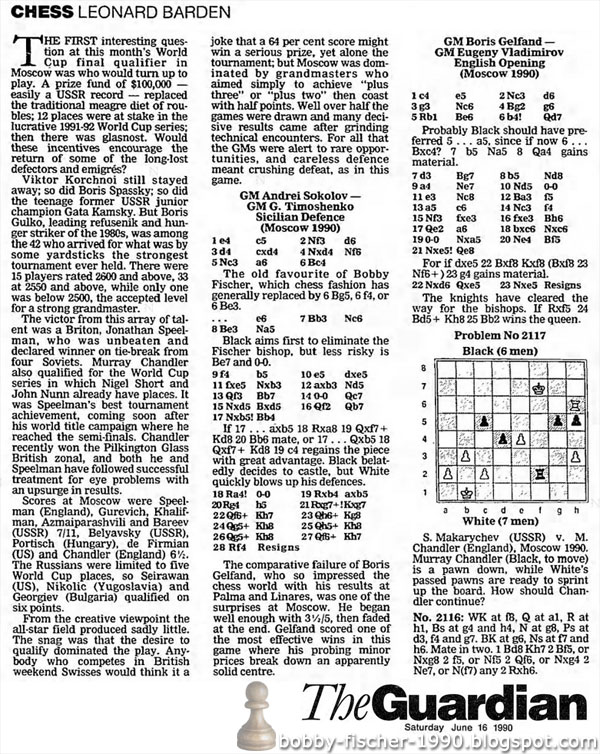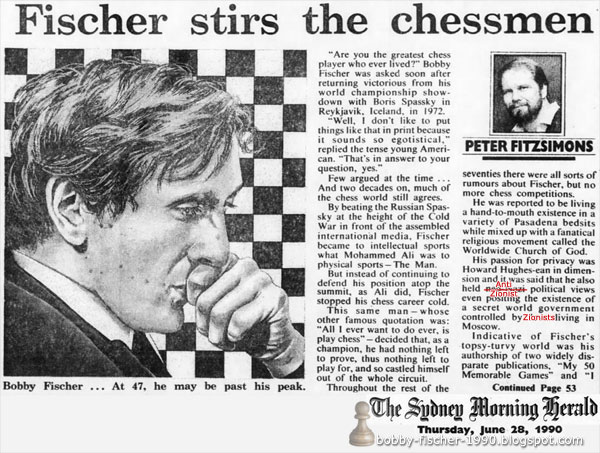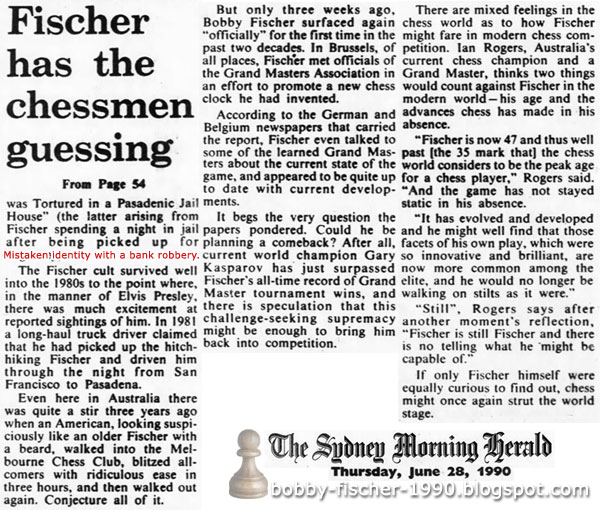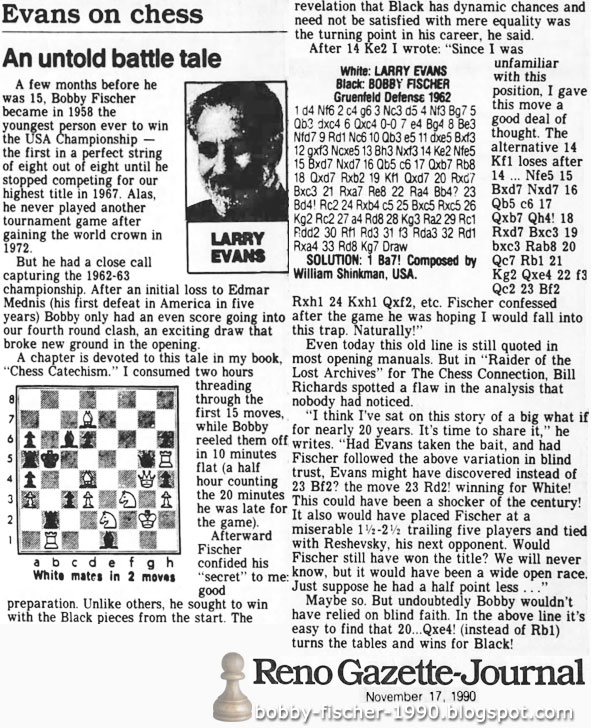The Guardian, London, Greater London, England, Saturday, June 16, 1990 - Page 46
“The old favorite of Bobby Fischer, which chess fashion has generally replaced by 6 Bg5, 6 f4, or 6 Be3.
Black aims first to eliminate the Fischer bishop, but less risky is Be7 and 0-0.”
The Sydney Morning Herald, Sydney, New South Wales, Australia, Thursday, June 28, 1990 - Page 54 (★)
Fischer Stirs The Chessmen
“Are you the greatest chess player who ever lived?” Bobby Fischer was asked soon after returning victorious from his world championship showdown with Boris Spassky in Reykjavik, Iceland, in 1972.
“Well, I don't like to put things like that in print because it sounds so egotistical,” replied the tense young American. “That's in answer to your question, yes.”
Few argued at the time…
And two decades on, much of the chess world still agrees.
By beating the Russian Spassky at the height of the Cold War in front of the assembled international media, Fischer became to intellectual sports what Mohammad Ali was to physical sports— The Man.
But instead of continuing to defend his position atop the summit, as Ali did, Fischer stopped his chess career cold.
This same man— whose other famous quotation was:
“All I ever want to do ever, is play chess” decided that, as a champion, he had nothing left to prove, thus nothing left to play for, and so castled himself out of the whole circuit.
Throughout the rest of the seventies there were all sorts of rumors about Fischer, but no more chess competitions.
He was reported to be living a hand-to-mouth existence in a variety of Pasadena bedsits while mixed up with a fanatical religious movement called the Worldwide Church of God.
His passion for privacy was Howard Huges-ean in dimension and it was said that he also held Anti-Zionist political views even positing the existence of a secret world government controlled by Zionists living in Moscow.
Indicative of Fischer topsy-turvy world was his authorship of two widely disparate publications, “My 50 Memorable Games” and “I Was Tortured in The Pasadena Jail House” (the latter arising from Fischer spending a night in jail after being picked up for mistaken identity with a bank robbery.
The Fischer cult survived well into the 1980s to the point where, in the manner of Elvis Presley, there was much excitement at reported sightings of him. In 1981 a long-haul truck driver claimed that he had picked up the hitch-hiking Fischer and driven him through the night from San Francisco to Pasadena.
Even here in Australia there was quite a stir three years ago when an American, looking suspiciously like an older Fischer with a beard, walked into the Melbourne Chess Club, blitzed all-comers with ridiculous ease in three hours, and then walked out again. Conjecture all of it.
But only three weeks ago, Bobby Fischer surfaced again “officially” for the first time in the past two decades. In Brussels, of all places, Fischer met officials of the Grand Masters Association in an effort to promote a new chess clock he had invented.
According to the German and Belgium newspapers that carried the report, Fischer even talked to some of the learned Grand Masters about the current state of the game, and appeared to be quite up to date with current developments.
It begs the very question the papers pondered. Could he be planning a comeback? After all, current world champion Gary Kasparov has just surpassed Fischer's all-time record of Grand Master tournament wins, and there is speculation that this challenge-seeking supremacy might be enough to bring him back into competition.
There are mixed feelings in the chess world as to how Fischer might fare in modern chess competition. Ian Rogers, Australia's current chess champion and a Grand Master, thinks two things would count against Fischer in the modern world—his age and the advances chess has made in his absence.
“Fischer is now 47 and thus well past [the 35 mark that] the chess world considers to be the peak age for a chess player,” Rogers said. “And the game has not stayed static in his absence.
“It has evolved and developed and he might well find that those facets of his own play, which were so innovative and brilliant, are now more common among the elite, and he would no longer be walking on stilts as it were.”
“Still”, Rogers says after another moment's reflection, “Fischer is still Fischer and there is no telling what he might be capable of.”
If only Fischer himself were equally curious to find out, chess might once again strut the world stage.
Reno Gazette-Journal, Reno, Nevada, Saturday, November 17, 1990 - Page 47
An Untold Battle Tale
A few months before he was 15, Bobby Fischer became in 1958 the youngest person ever to win the USA Championship — the first in a perfect string of eight out of eight until he stopped competing for our highest title in 1967. Alas, he never played another tournament game after gaining the world crown in 1972.
But he had a close call capturing the 1962-63 championship. After an initial loss to Edmar Mednis (his first defeat in America in five years) Bobby only had an even score going into our fourth round clash, an exciting draw that broke new ground in the opening.
A chapter is devoted to this tale in my book, “Chess Catechism.” I consumed two hours threading through the first 15 moves, while Bobby reeled them off in 10 minutes flat (a half hour counting the 20 minutes he was late for the game).
Afterward Fischer confided his “secret” to me: good preparation. Unlike other, he sought to win with the Black pieces from the start. The revelation that Black has dynamic chances and need not be satisfied with mere equality was the turning point in his career, he said.
After 14 Ke2 I wrote: “Since I was unfamiliar with position, I gave this move a good deal of thought. The alternative 14 Kf1 loses after 14 … Nfe5 15 Bxd7 Nxd7 16 Qb5 c6 17 Qxb7 Qh4! 18 Rxd7 Bxc3 19 bxc3 Rab8 20 Qc7 Rb1 21 Kg2 Qxe4 22 f3 Qc2 23 Bf2 Rxh1 24 Kxh1 Qxf2, etc. Fischer confessed after the game he was hoping I would fall into this trap. Naturally!”
Even today this old line is still quoted in most opening manuals. But in “Raider of the Lost Archives” for The Chess Connection, Bill Richards spotted a flaw in the analysis that nobody had notice.
“I think I've sat on this story of a big what if for nearly 20 years. It's time to share it,” he writes. “Had Evans taken the bait, and had Fischer followed the above variation in blind trust, Evans might have discovered instead of 23 Bf2? the move 23 Rd2! winning for White! This could have been a shocker of the century! It also would have placed Fischer at a miserable 1½-2½ trailing five players and tied with Reshevsky, his next opponent. Would Fischer still have won the title? We will never know, but it would have been a wide open race. Just suppose he had a half point less…”
Maybe so. But undoubtedly Bobby wouldn't have relied on blind faith. In the above line it's easy to find that 20…Qxe4! (instead of Rb1) turns the tables and wins for Black!


























